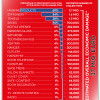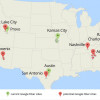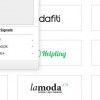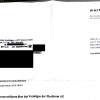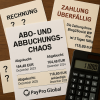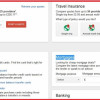
Mozilla Problem: WOT Web of Trust Is Not Trustworthy
The concern of "WOT - Web of Trust" is perfectly legitimate - namely, to provide guidance on the web. With the help of Mozilla Firefox the ad-on "WOT - Web of Trust" promises that you could get orientation. For this purpose, each website is categorized by WOT in a uniform way :
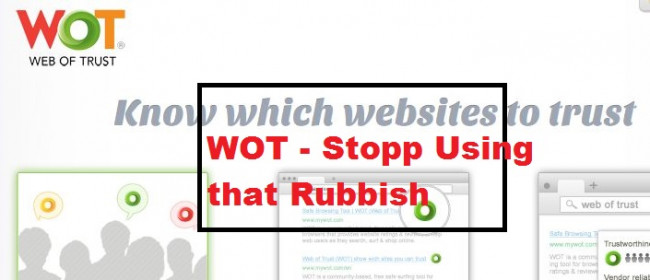
The website WOT Web of Trust says they have already more than 35 million worldwide users. But how wonder: The page is still prominently downright imposed to the users by Mozilla Firefox browser with the help of best placements in the ad-on List. But, the voices distrust the WOT increase - and for good reason. netz-trends.de will try to explain why.
The Method: Four criteria are queried for websites: Trustworthiness (reliability), vendor reliability (Seller / reliability), Privacy (data protection compliance) and Child Safety (Child safety / protection of minors). Whether the criteria are suitable to a Web page does not matter in the WOTler world. "WOT - Web of Trust" acts very skilled on a wave of platitudes.
The Mozilla ad-on once downloaded, can be somewhat arbitrary apparently not only encrypt and judge, but the call of every page using Firefox in the future is seized by an Internet censorship authority. That is the bottleneck that very website now has to pass. Each time the Mozilla Firefox browser is opened screeching capricious evaluations occur. They suggest to be based on supposedly reputable assessments.
Brushing black and white with powerful strokes
"WOT Web of Trust" paints the he Internet world with strong strokes in black and white, the world is divided into good and evil. If a website has a number of negative votes, a dramatic "Warning!" Poster shrilly pops over the entire screen and also over the front lens of the insecure website visitor. The exclamation point behind the huge written word "Warning " suggests that this site has a bad reputation based on user reviews . It seems to be like a popping sheriff at a traffic intersection.
"WOT - Web of Trust" thanks Mozilla Firefox has slammed the side and moreover wraps it with an impervious dark gray porridge-veil. "WOT - Web of Trust" is not a recommendation for the use of websites, but has in far too many cases mutated to an aggressive attack against a side that will apparently prevent one thing: The fact that users are not able to make a picture of a website by themselves.
Anybody who goes a little further now runs into the ruin, the ruin of Who goes on a little nudge now, the run to ruin the internet ruin of a website that honestly has to be switched off - so the "WOT - Web of Trust"-steam hammer could be interpreted. But is that really so? Nobody knows. How many votes have been taken into account is not transparently told.
One has the impression that only a few dozen reviews are needed to push a website - to the red light district of internet - even with millions of users a month. Strange: Even after several tests you cannot avoid the suspicion that a private Voting ultimately has zero impact on the ranking of a website. One wonders: Go to "WOT Web of Trust" really all above board?
A big question mark
Rather one has the impression: on the one hand, it has no impact on the voting, even when several colleagues or friends on different IP numbers of the computer vote. On the other hand WOT seems as if there were still people or machines manipulating the WOT site assessments - for better or for worse. Most Helpful the comments could be partly superimposed. But: What is the use of 100 or less votes when a website has two million users a month? It is indeed very well known: Many people use WOT comment functions to express their frustration over a page. But: Is it representative when users perpetuate themselves at ppm level ?
On Wikipedia, there are 20-year-old right-handed administrators who change, hinder or promote texts - even if they have no expertise in the area. Who are the administrators of WOT, what makes their competence, their independence, their credibility, their fairness? And how many are there? Where are they? How did they become administrators at WOT? On Wikipedia, they can at least have contact with some research. WOT contact attempts have led to nirvana. This not just increases confidence.
Manipulation rumors - they are not silent but get louder
The rumors that at WOT there are masses of manipulated web pages assessments - they do not fall silent, but are getting louder. But not primarily users are suspected but the makers in the background. And even if the votes of the users would actually be a relevant factor in the assessment of the websites? Why is it not possible to bring a unique name to connection to an assessment ? Why is it that the number of votes is never published transparently, as is the case for example with the button "I like it" on Facebook? Or the Google social media button? Then maybe you would have to admit that it is a single WOT inflated and upgraded Mozilla Firefox bubble that actually belonged as an ad-on from Mozilla in its current form and would have to be eliminated?
Would WOT act similarly transparent as Facebook or Google, at least in social media area - it would be much easier to prevent the impression WOT would be frivolous. Then it would be much more credible that the users really are the focus and not arbitrary megalomania in the network. And more Transparency would also exclude something easier that users unpleasant pages that they just do not "like" completely arbitrary downgrade or pages they "like" upgrade arbitrary mass. For as often as you also click at WOT, is always one suggests that they have actually made a relevant voting. When you look more closely serious doubts are more reasonable.
It is high time to consider "WOT - Web of Trust" more critical than has been done. Because the site grows almost monthly to a million users.
A serious benchmark is something different
Also rumors that there exist freaks who have written computer programs that automate specific websites regularly - let the Worst Rated do not help with little inspiring confidence to "WOT Web of Trust". Is there really done anything to prevent this? WOT says yes. Even here WOT could not convince yet.
Wherever you look, one over and over again falls at WOT test the arbitrariness of the whole system, which manifests itself as a climax in the uniform and arbitrariness for many pages and irrelevance of the requested criteria. Why the kid’s safety is queried, for by example, flight booking portals, is as mysterious as a general query for an unspecified circumscribed alleged "credibility" of a web page, the "seller-reliability" or adhering to the "Privacy Policy". Why, for example, the "seller-reliability" voting for spiegel-online would carry weight with 25 percent at WOT, although it is a journalistic offer - we do not know and do not understand it.
Rumors that rate negative votes more strongly
Due to the already mentioned doubt, may we not believe what WOT large writes, namely, that the ratings of the sites were due solely to "reputation ... based on real user ratings." Therefore remains a stale aftertaste when WOT says the assessment of sites would mainly help the site visitors to learn "how much other users trust this site". Although hidden "WOT - Web of Trust" in small print behind a thin link that the reviews are not waterproof representative, but that should be shown almost none ....
Another rumor that confidence in "WOT - Web of Trust" is not just increased: In the U.S., there are statements that a negative WOT rating would have to follow at least 15 positive. For this purpose, an unspecified circumscribed WOT person has justified on a U.S. blog as follows: "Users have to earn the system's trust Before their ratings gain weight, Which is why creating multiple accounts and spamming ratings for a site has very little impact on the reputation. " Aha: So on top of that decide the WOT leaders who can vote and who is not, what is weighted rating and which are not.
That much at "WOT - Web of Trust" is not done properly, is also evident that Facebook had completed an initial cooperation with the "Assessment" page after a several-week test run again, as they say. So probably many companies users have complained to Facebook, the company sides had invested in the social network, that when you click on Facebook on their link the rather arbitrary WOT rating ("Warning. This site has a bad reputation!") Massively scared have.
Hundreds of millions of websites - but it seems WOT is supposed to know them all
In the Internet there are hundreds of millions of websites - but "WOT - Web of Trust" godlike seems to know everyone. No matter where you look: Everywhere recommendations or red, orange or green warning signs are distributed - up to Google ads, that WOT of course places generously despite daily changing keywords and ads. The WOT megalomania seems to know no bounds they seem to dream of the omnipotence of colorful web WOT smarties and thanks to Mozilla Firefox also are getting closer to this goal.
It is to learn that in the U.S., several companies are preparing, a lawsuit against "WOT - Web of Trust" in order to defend themselves against what they regard as "dubious valuation machinations of the portal." Also in Germany there are companies who increasingly take such considerations. This is not going to be simple, because freedom of expression is known to have wide wings.
Also the masterminds of WOT know that and hide behind the principle of freedom of expression and as important in good addition behind a legal elusive form of society, a "Limited" (Ltd).
Despite the threat of further legal proceedings, the WOT Services Ltd. could now celebrate a partial success in the U.S., the country where anything is possible. A court in the state of Florida had at least one case in which a contractor had complained against WOT, could see no wrongdoing by WOT.
However, there were also several procedural errors of the plaintiffs. The allegations against the Company denominated WOT etc. Slander (defamation), violation of rights (viola marketing rights), dubious activities (conspiracy) and manipulation of WOT assessment algorithm (manipulating algorithm).
"WOT - Web of Trust" during the proceedings invoked on an ancient U.S. Internet Act of 1996, specifically to the "article 230 of the Communications Decency Act." The article protects Internet companies and the content quite encompassing and inclusive. Here, the judgment in the industry is quite controversial because the court has obviously does not seen through the WOT system consistently. "WOT - Web of Trust" nevertheless hailed the court's decision, saying it was "very important for WOT, although the criticism of WOT" anyway had been "absolutely groundless".
WOT is pleased with U.S. legal system
The Chief Executive Officer of WOT Services Ltd., Vesa Perälä, also wrote that the U.S. court decision would "clearly show" that the United States 'Freedom of Speech' ruff about everything, so that what WOT does would also be also lawful . That in the U.S. courts acts almost limitless pull in the dissemination of opinions or assertions, is known and is considered a major deficit in a that legal system: Celebrities or non-celebrities must put up with, for example, press law, when photographers fly aircrafts above their gardens to make private photos that then are disseminated in the media.
In countries such as Germany such a thing is unthinkable. In its opinion on the U.S. court decision WOT - Web of Trust because even regretted and said " that the European court ruling can act more complex as in the U.S. and here not everything can be disseminated”. Since the arbitrariness in the "WOT - Web of Trust" system is obvious, companies in Germany that fight back against "WOT - Web of Trust", could, for example have better opportunities and chances than in the U.S.WOT sells an expensive seal up to circa € 598
"Part of the debate is an - WOT Web of Trust" up to circa € 598 expensive seal that "WOT Trust Seal" (mywot.com/ en / trust seal / comparison), sells to home pages. Thus, there are circulating rumors that websites could possibly buy themselves a better listing on the WOT website on the Internet. Whether this is so, could not be verified. WOT did not respond to a request. Anyway, on a U.S. blog an unspecified circumscribed WOT person disagreed vehemently to the accusation of Salability: "Reputations are not for sale. In fact, you can only buy a trust seal if your site has already earned a good reputation and should go bad reputation in the future, you will lose the trust seal. "And further: "WOT does not rate websites and has no incentive to rate sites poorly in order to sell you something."
By this Wot web of trust contradicts itself to a significant extent. It was said elsewhere, WOT quite decides what assessment flows into the overall presentation of a website and what is not. Namely apparently only those who advocated and accepted WOT.
Our conclusion therefore: netz-trends.de cannot avoid to make a tough decision about WOT. We have the feeling that Wot - Web of Trust cannot be trusted. The site is not transparent, the valuation categories are too narrow and insufficiently differentiated. Furthermore we do not trust WOT to give representative and fair assessment of websites. Therefore, Mozilla Firefox should quickly dispose of this ad-on.
More critical background article on WOT:
http://www.ripoffreport.com/internet-services/web-of-trust/web-of-trust-my-web-of-trust-c34ad.htm

